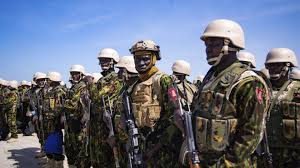World
Haiti Faces Potential Replacement of Kenya-Led Police Force Due to Funding Challenges

Funding shortages may result in the replacement of the Kenya-led police force in Haiti, as concerns grow over the future of security and international support in the region.
On Friday, a draft resolution was put forth by the United States of America and Ecuador calling for the United Nations to initiate preparations for replacing Kenya’s mission with a U.N. peacekeeping operation in the Caribbean nation.
Since June, nearly 400 Kenyan police have been deployed as part of a mission supported by the United Nations.
The US top diplomat suggested on Thursday that a U.N. peacekeeping force could be utilized to solve the funding crisis of the Kenya-led mission, which solely relies on voluntary contributions.
Up to this point, the majority of funding has come from both the U.S. and Canada; however, peacekeeping operations are financed through a distinct budget specifically allocated by the United Nations.
While the Security Council resolution may acknowledge the progress achieved by the U.N.-supported multinational mission, it has not yet proven to be a significant catalyst.
The state of emergency in Haiti was extended last week to encompass the entire country.
In 2017, the UN’s previous mission in Haiti departed from the island. It was held responsible for disposing contaminated sewage into a river that sparked an outbreak of cholera.
A sex ring involving nine Haitian children was exploited by 134 UN peacekeepers between 2004 and 2007, as reported in an internal document of the United Nations.
The UN peacekeeping mission in Haiti, which has been plagued by scandal, will be terminated. Check out:
The country was on the verge of collapse due to a rebellion in 2004, resulting in the deployment of a U.N. force that helped stabilize it. Following successful elections and an earthquake in October 2017 that claimed up to 300,000 lives, the impoverished nation slowly began its recovery.
However, the departure of U.N. peacekeepers was marred by controversies – Nepalese troops were largely held responsible for bringing in cholera which caused approximately 10,000 deaths in Haiti since 2010; various other troops were also accused of sexual misconduct such as rape and exploitation of undernourished children.
Starting in 2017, the United Nations initiated several small missions throughout Haiti. Currently, their newest political endeavor known as BINUH aims to promote a Haitian-led path towards elections and prioritizing human rights while enforcing the rule of law.
The idea of having another peacekeeping operation has been turned down by several Haitians, mainly due to the corruption that took place during the previous mission. Moreover, certain groups consider U.N. peacekeepers as invaders rather than a force for stability in their country.
In 2022, Haiti requested assistance from an international force to combat gangs. The U.N. Secretary-General António Guterres made numerous appeals for a country to lead the operation until Kenya stepped forward and committed 1,000 police officers. Additionally, police forces from Bahamas, Bangladesh, Barbados, Benin ,Chad and Jamaica are expected to join in which will result into a multinational force of around 2,500 personnel.
The deployment would occur in stages which carry an approximate yearly cost of $600 million. At present, the U.N. has received pledges amounting to $85 million for the mission, with a total of $68 million already collected.
Civilian vigilante groups have risen in response to the increasing power of gangs, who are believed to command up to 80% of the capital following President Jovenel Moïse’s assassination on July 7th, 2021. Rising levels of killings, rapes and kidnappings have prompted this outbreak of violence among civilians seeking justice.
During February, police stations and the main international airport were subjected to synchronized assaults by gangs. The airport remained shut down for almost three months due to these attacks. Additionally, Haiti’s two biggest prisons were taken over by them which resulted in setting free more than 4,000 prisoners who had been detained there.
Blinken observed a decrease in violence before the initial group of Kenyan police arrived towards the end of June. He also reported that economic activity has resumed in certain parts of Port-au-Prince, and collaborative efforts have resulted in victories such as reclaiming authority over Haiti’s largest public hospital.
Notwithstanding, gangs persist in assaulting the neighborhoods adjacent to Port-au-Prince.
The proposed resolution aims to declare that “the state of affairs in Haiti remains a risk factor for worldwide peace, security, and regional stability.”
As a show of appreciation to Kenya, the mandate of the Multinational Security Support mission will be prolonged until October 2nd, 2025 as per UN’s plans for transition towards peacekeeping operation.
On Friday afternoon, the Security Council specialists convened to discuss the resolution’s content. Ongoing discussions are anticipated and a council representative stated that talks were confidential under anonymity. At present, no voting date has been scheduled.
According to Stephane Dujarric, the U.N. representative, obtaining approval from the Security Council is necessary for any newly established peacekeeping force. Furthermore, member nations of the United Nations must offer their troops and requisite equipment; subsequently resulting in deployment – which usually consumes time as indicated by Mr. Dujarric.
